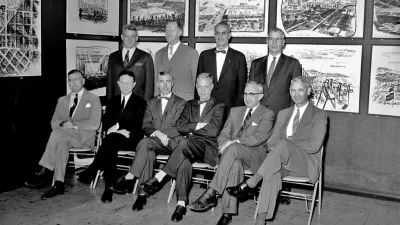Deland Chan, a lecturer in the Urban Studies program at Stanford University and co-founder of the Stanford Human Cities Initiative, makes the case for a bigger tent for planners and planning.

An article by Deland Chan suggests a new definition for the concept of "real planning" to ensure that women get more credit for the contributions to citymaking of the past, and that underrepresented groups have more of a role in the planning of the future.
For instance, Chan cites the work of "women-organized clubs that led the charge for urban beautification at the turn of the 20th century. " Plans like Charles Mulford Robinson’s General Plan for the Improvement of Colorado Springs (1912) erased the contributions of these clubs, in a familiar narrative about men consolidating and protecting their role in the making of history.
That example is a symptom of a larger problem, according to Chan—that the "planning canon, as it currently exists, reinforces a binary notion of what 'real' planning is and isn’t." While the ambitious plans, backed by institutional political and financing clout get credit, "planning from below, and 'soft,' people-centered work like community outreach, are not ascribed the same kind of value." Chan adds:
If we expanded the definition of planning, we might include Majora Carter’s workforce development and environmental justice work in the South Bronx, or Antionette Carroll’s Creative Reaction Lab, which tackles inequity in St. Louis. Carter, Carroll, and many other women leaders are not “real” (i.e. professionally trained and certified) planners, but they have shaped their cities and amplified place-based work already happening in low-income communities of color.
Finally, Chan puts out a call to action to the academic programs around the country to take a leadership role in redefining the scope of what's considered real planning:
To start, colleges and universities that make up the pipeline of future planners should rethink what they teach. It is time to recognize that our shared identity as planners is based on privileging the contributions of certain individuals and groups over others. In specific terms, institutions can reshape curricula to include missing or marginalized voices.
FULL STORY: What Counts as 'Real' City Planning?

Analysis: Cybertruck Fatality Rate Far Exceeds That of Ford Pinto
The Tesla Cybertruck was recalled seven times last year.

National Parks Layoffs Will Cause Communities to Lose Billions
Thousands of essential park workers were laid off this week, just before the busy spring break season.

Retro-silient?: America’s First “Eco-burb,” The Woodlands Turns 50
A master-planned community north of Houston offers lessons on green infrastructure and resilient design, but falls short of its founder’s lofty affordability and walkability goals.

Test News Post 1
This is a summary

Analysis: Cybertruck Fatality Rate Far Exceeds That of Ford Pinto
The Tesla Cybertruck was recalled seven times last year.

Test News Headline 46
Test for the image on the front page.
Urban Design for Planners 1: Software Tools
This six-course series explores essential urban design concepts using open source software and equips planners with the tools they need to participate fully in the urban design process.
Planning for Universal Design
Learn the tools for implementing Universal Design in planning regulations.
EMC Planning Group, Inc.
Planetizen
Planetizen
Mpact (formerly Rail~Volution)
Great Falls Development Authority, Inc.
HUDs Office of Policy Development and Research
NYU Wagner Graduate School of Public Service




























